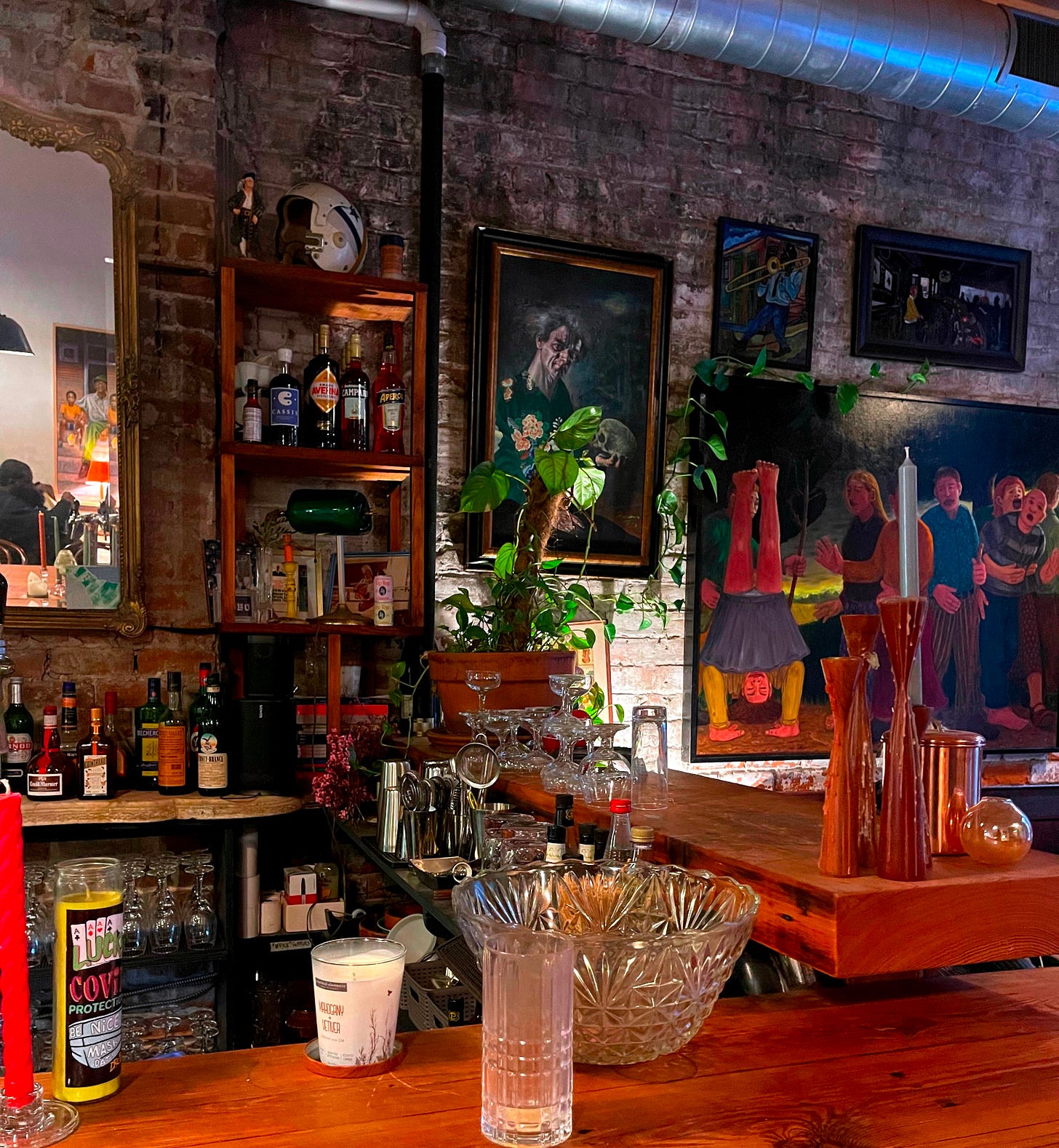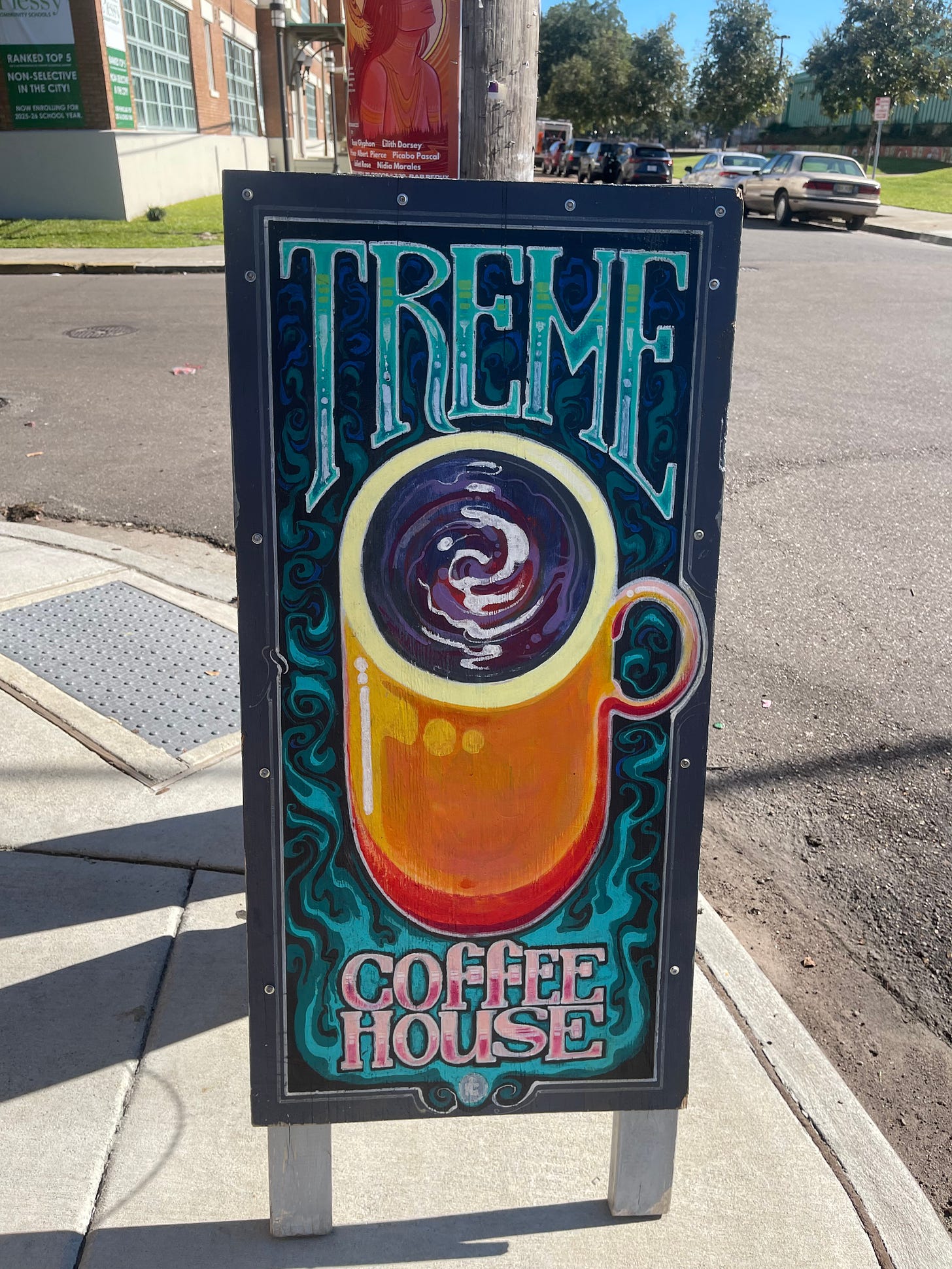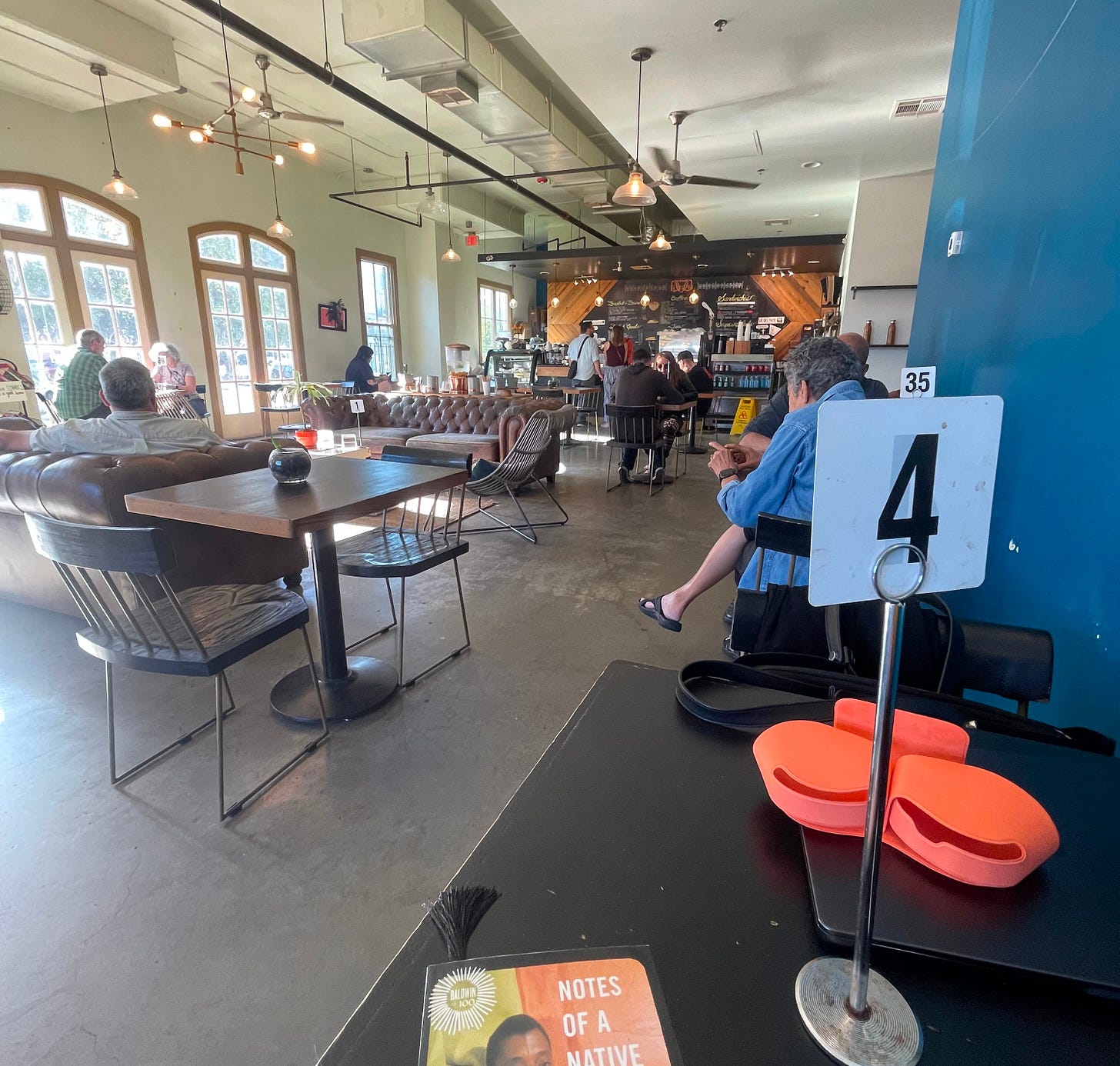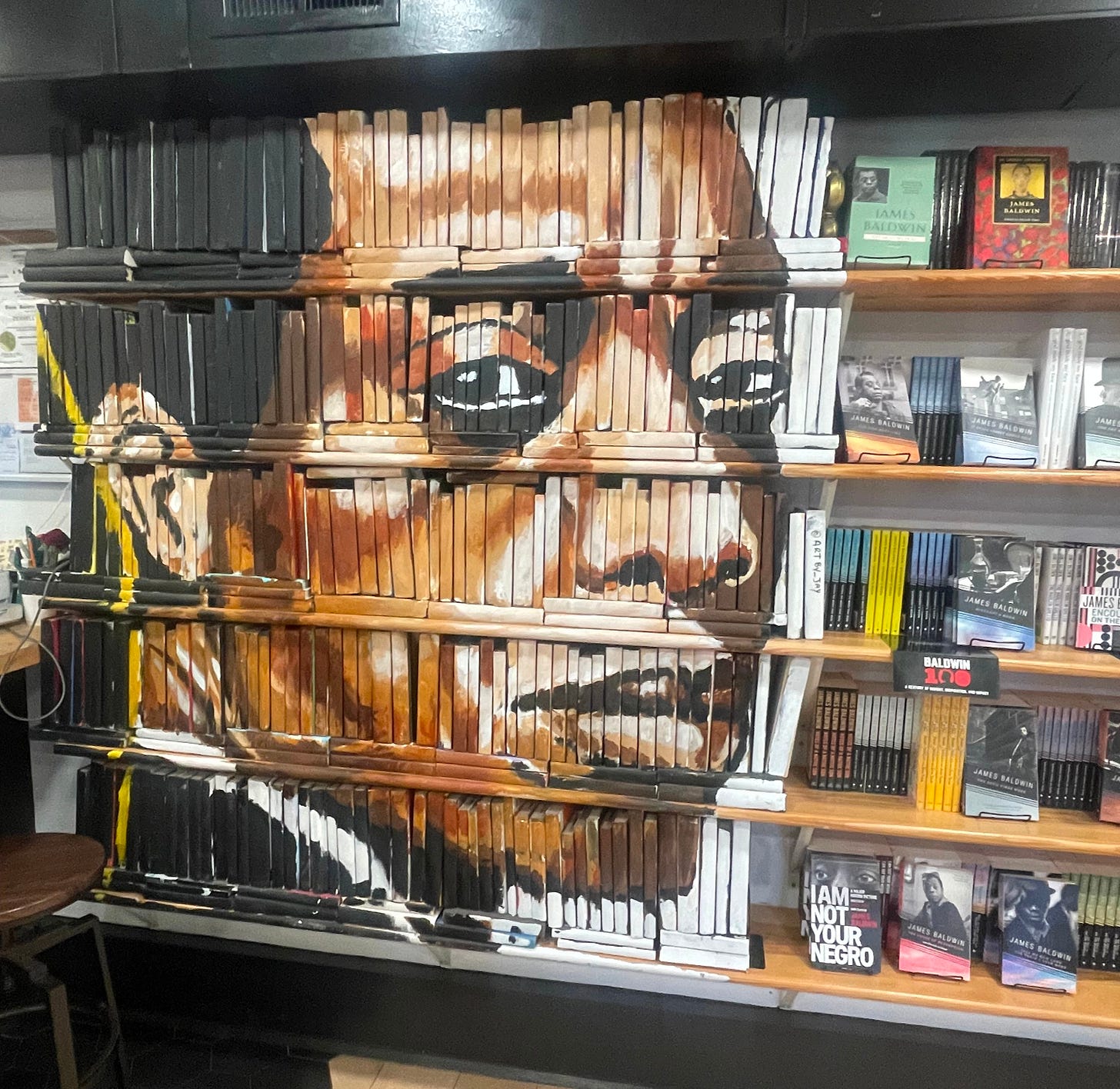Notes from New Orleans (Part 1): Writing Portals
Stepping through New Orleans is always like stepping through time.

It’s too easy to step through time portals in New Orleans. On Friday night, my husband and I had dinner at Elysian Bar, tucked in the Marigny neighborhood near Frenchman Street. To get there, we decided to walk from the French Quarter. As we crossed Esplanade Avenue (a dividing line between The French Quarter and Faubourg Marigny), the world seemed to shift. The streets grew darker, quieter, and more intimate, lit only by the flicker of glass street lamps. Their gentle glow cast shadows on the Creole cottages, conjuring an old-world charm that made it feel like we had wandered into another era.
The Elysian Bar resides within the Hotel Peter and Paul, a space of transformation. Once a church and schoolhouse, it now stands restored, its past woven into every corner. I’ve never stayed at the hotel, but a quick glance at the layout of the rooms on the website illustrates exactly what I mean when I say that spaces in New Orleans bend time. Even though the rooms themselves are fairly updated and modern, the website notes that many were originally convent rooms. The history is always lurking in the details of this city.
We didn’t eat in the church (I didn’t even initially realize that was an option) but instead, in a quaint, quiet parlor that reminded us of our wedding reception venue— The Opera Guild Home in the Garden District (another New Orleans time portal). The food was so incredible that I ordered dessert (which I never do)— blueberry milk and cookies— and I don’t even drink milk! All dietary restrictions and my typical reservedness go out the window when I’m in New Orleans. I trust Nola to take me wherever she wants me to go. I think I might have clocked in 26,000 steps on Friday alone, just following her rhythms.
Anyway, this trip was half about attending a work conference and half about attending to my writing. So instead of over planning the trip like I usually do, I asked friends for writing space recos-- vibey coffee shops and co-working spaces. I wanted to step through time-- through history but also into an imagined, yet-to-be-realized future where all I do is write in shadowy, ethereal coffee shops in New Orleans. Here is a brief list of the portals I explored, but specifically the ones that related to my writing adventure.
Fourth Wall Nola - Coffee Shop and Event Space (Downtown Nola)
Fourth Wall Nola is housed in the Beaubourg Theatre building, which was built in the 1840s and once housed an Edison photography shop. The owner, a New Orleans art school grad, said he wanted to provide “the things an art-making culture needs besides the venue.” Although Fourth Wall Nola is a coffee shop by day, I noticed signs of its alter ego as an event space at night-- there’s an unattended full bar in the middle of the shop just before you get out to the courtyard. Coffee and wine… definitely two things every writer needs.
Treme Coffeehouse - Coffee Shop (Treme)
This wasn’t a new place. It’s the first coffee shop I visited in New Orleans and the one I’ve frequented the most. My mission was to go to all new spots, but my husband wanted to go to the Backstreet Cultural Museum for the first time, and I knew this spot was on the same block. So, I worked on my book while he visited the museum.
I love this place because it’s right in the heart of Treme, the oldest Black neighborhood in the United States. Every time I step foot in Treme, something absolutely magical happens to me, and this visit was no different. In another note in this series, I will share what happened on our walk back from the coffeehouse when we discovered the Cala’s Cafe and met an old man who told us a (somewhat) haunting story about Congo Square, but for now, suffice it to say that it was another magical walk through Treme.
Backatown Coffee Parlour - Black-Owned Coffee Shop (Old Storyville)
Though technically in the historic Treme neighborhood, Backatown sits right within the bounds of the old New Orleans Red Light District, popularly called “Storyville.” Storyville got its name from Alderman Sidney Story, who wrote the zoning rules for the area, which made it the only place in the city where sex work was somewhat regulated/tolerated. Backatown’s website states that the space “embodies the aura of the time where you could hear the sounds of Jelly Roll Morton, Louis Armstrong, and King Oliver and meet folks from all walks of life.” I noticed that it was near the site of “The Lost Sock,” a laundromat that now sits in the venue where America’s first rock and roll songs were recorded (More on that in another note because it’s one of the places the Congo Square guy sent us)
Baldwin and Co. coffee + bookstore- Black-owned bookstore (Marigny)
Baldwin and Co. sits seven blocks from the Mississippi River, not far from ports and slave pens that were once the epicenter of the United States slave trade. This is something that I absolutely can not stop thinking about any time I’m in New Orleans, especially when I’m near some sites like Cafe Du Monde in the French Quarter, which is adjacent to one of those ports; the Omni Hotel on Bourbon Street, which was a site of daily slave sales for decades, under its previous name— the St. Louis Hotel; or Esplanade Avenue, the street I crossed over to go to the Elysian Bar, which was a major port route once upon a time and also known as “millionaires row” (no question how those folks made their millions).
Baldwin and Co., a Black-owned bookstore, collapses time in a way that its presence defies its past. Esplanade Avenue intersects with Elysian Field Avenue, another broad boulevard that (according to Wikipedia) “originated in the early 19th-century placement of a sawmill canal on the Marigny Plantation.” A Black-owned bookstore that honors one of the most prolific Black gay writers of all time isn’t anachronistic, but who could’ve ever imagined back when this area was still a plantation that something that like could exist on land that was literally built to extract unpaid labor from Black folks?
I’m not suggesting that Black capitalist ventures are in any way revolutionary, but as a celebration of culture, learning, and history, it is a special place. The owner confirms that it was born out of a love for learning, literature, and community, and as a testament to this, there are literacy programs, free book giveaways, and author events where the writers are allowed to keep 100% of the profit they make off their work. Apparently, they also have an Airbnb on site, which is just asking me to book it as a writing retreat space.
I bought a copy of James Baldwins’ Notes of a Native Son, which I read on a sun-drenched patio until Nola told me it was time to explore some more.
[Thank you to my IG friends who sent me these recos. I listened!]






I can’t wait to visit these spots! I’ll be there next month for my own conference/writing trip!
Also—you are such a beautiful storyteller!
Absolutely loved this recap and adding the Baldwin bookstore to my list for next time!!